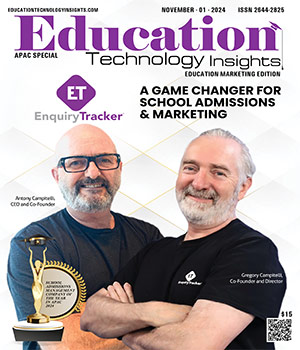THANK YOU FOR SUBSCRIBING
Be first to read the latest tech news, Industry Leader's Insights, and CIO interviews of medium and large enterprises exclusively from Education Technology Insights
Navigating the Digital Shift with Data-Driven Strategies
Brian Rabuffetti, Director of Program Marketing at Harvard Medical School
 Brian Rabuffetti, Director of Program Marketing at Harvard Medical School
Brian Rabuffetti, Director of Program Marketing at Harvard Medical SchoolWith over a decade of experience in educational marketing, Brian Rabuffetti has witnessed and adapted to the transformative shift from traditional to digital marketing strategies. He is actively involved in multiple projects at Harvard Medical School, including the implementation of Google Analytics 4 and the revitalization of the institution's website.
In an interview with Education Technology Insights, Rabuffetti sheds light on the challenges in the educational marketing space and underscores the importance of collaborating with key stakeholders like faculty and IT teams to establish a robust brand presence.
How has educational marketing changed over the years?
Originally centered around conventional approaches like brochures and emails, there has been a dynamic shift in emphasis toward digital marketing. The key now is meeting potential learners and leveraging digital platforms to engage them effectively. With the transition to online education, decision-making timelines and outreach strategies have changed significantly. We now rely heavily on search engine marketing, social media and display networks to drive leads into our email automation for nurturing conversions.
What are some of the primary challenges faced in digital marketing?
Digital marketing allows us to better understand the effectiveness of marketing than some other tactics. However, measuring the impact of digital marketing is still a challenge. Demonstrating its effectiveness requires robust data tracking tools like Google Analytics. It is essential to measure conversions, differentiate between various digital marketing types, and focus on strategies like search engine marketing for interested leads ready to consider our offerings.
“The traditional idea of marketing, as depicted in shows like Mad Men, is fading. In today's landscape, making decisions based on data and logic is crucial for achieving the best results.”
Retargeting is effective. However, the real challenges lie in constructing audiences and the optimal imagery and messaging. Additionally, changes in privacy laws and cookie usage impact tracking methods, posing obstacles. Paid social media like Facebook has its challenges, too. LinkedIn can be cost-heavy, but it promises higher-quality results. The LinkedIn platform provides the most detailed understanding of its audience, and its operating model of a professional network is ideal for education marketing.
Can you walk us through some of the latest projects you have been working on?
Currently, we are transitioning from Google Analytics and implementing Google Analytics 4, with an aim to optimize tracking efficiency. We are in the process of revamping our website, keeping in mind user experience and search engine optimization. Additionally, we are examining our CRM and email systems to ensure everything aligns with our goals.
How do you identify the right tech solutions or partnerships to ensure you obtain the necessary functionalities and features?
We consider the capabilities and compatibility of various marketing technologies like email providers or application systems. Tools like Emma, HubSpot, and Salesforce Marketing Cloud offer different advantages. However, the common benefit is that these seamlessly integrate with our CRM and allow for precise audience segmentation and customized messaging.
How do you envision the future to impact the education marketing arena?
Predicting specific changes is challenging, but it's evident that technology will continue to evolve. Similar to how news consumption has shifted, the way people find educational programs will change. Lifelong learning in hybrid and online formats is the way of the future for the education sector. Postgraduate, executive, professional, and continuing educational growth will significantly exceed the ungraduated numbers. For marketers, this calls for various educational options and pathways tailored to each individual's background and aspirations. Technology can be leveraged to offer educational opportunities appropriate for each individual, much like streaming services suggest content based on personal interests.
How do you draw an analogy between your interests and your marketing approach?
I view marketing as a logical, analytical, and data-driven process rather than relying on a smooth-talking pitch. The traditional idea of marketing, as depicted in shows like Mad Men, is fading. In today's landscape, making decisions based on data and logic is crucial for achieving the best results.
What is your sage advice to your fellow peers and aspiring professionals in the industry?
The real focus lies on the educational content that is being offered. Identifying your customers and understanding their needs is extremely crucial in marketing educational insights. Taking competitors into account, collaborating with key partners like the IT and educational teams, and maintaining a strong brand identity are also vital elements of a successful marketing plan.
Weekly Brief
Featured Vendors
Read Also
The Power of International Education Collaborations
Designing Schools around Student Voice
What is Edtech Leadership in 2026
Designing Academic Leadership Around Real Lives
Why Student Success Begins with Being Seen
Inclusion is not a Department: The Systemic Ripple Effect of Belonging

I agree We use cookies on this website to enhance your user experience. By clicking any link on this page you are giving your consent for us to set cookies. More info

























